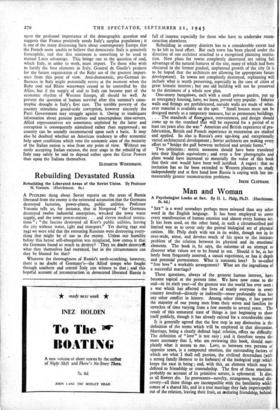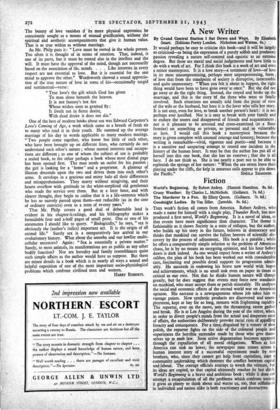Man and Woman
A Psychologist Looks at Sex. By H. L. Philp, Ph.D. (Hutchinson. 8s. 6d.) A Psychologist Looks at Sex. By H. L. Philp, Ph.D. (Hutchinson. 8s. 6d.)
" SEX " is a word nowadays perhaps more misused than any other word in the English language. It has been employed to cover every manifestation of human emotion and almost every human act. It has been used, on the other hand, in such a circumscribed and limited way as to cover only the primal biological act of physical coition. Mr. Philp deals with sex in its wider, though not in its over-wide, sense, and devotes much of his space to the intricate problem of the relation between its physical and its emotional elements. The book is, he says, the outcome of an attempt to discover what values are to be found in sex. Should it be, as has lately been frequently asserted, a casual experience, or has it depth and potential permanence. What is romantic love? Is so-called " free love" a workable arrangement? What are the ingredients of a successful marriage?
These questions, always of the greatest human interest, have become topical at the present time. We have now come to the end—in its sixth year—of the greatest war the world has ever seen ; a war which has affected the lives of nearly everyone in every country involved—directly or indirectly—more profoundly than has any other conflict in history. Among other things, it has parted the majority of our young men from their wives and families for stretches of time varying from a few months to several years. The result of this unnatural state of things is just beginning to show itself publicly, though it has already existed for a considerable time.
It is generally agreed that the first step in any discussion is the definition of the terms which will be employed in that discussion. Marriage, being a clearly defined legal relation, offers no difficulty. The definition of " love" is not easy ; and it therefore seems the more necessary that I, who am reviewing this book, should state plainly what it means to me. Love, as between two persons of opposite sexes, is a compound emotion, the outstanding factors of which are what I shall call passion, the civilised descendant (with a strong family likeness to its forbears) of the biological urge which keeps the race in being ; and, with this, an element which may 11e defined as friendship or comradeship. The first of these emotions, probably on account of its primitive nature, is ephemeral. It dies, as all flowers die. Its provocants—novelty, strangeness, mutual dis- covery—all these things are incompatible with the familiarity which comes of a shared life, and in a true marriage they fade imperceptibly out of the relation, leaving their fruit, an enduring friendship, behind. The beauty of love vanishes if its mere physical expression be consciously sought as a means of sensual gratification, without the spiritual and aesthetic accompaniments that give it human value. That is as true within as without marriage.
As Mr. Philp puts it : " Love must be rooted in the whole person.
Too often it is thought of in terms of emotion. That, indeed, is one of its parts, but it must be rooted also in the intellect and the will. It must have the approval of the mind, though not necessarily based on the association of like minds. . . . Like interests in every respect are not essential to love. But it is essential for the one mind to approve the other." Wordsworth showed a sound apprecia- tion of the true nature of love in some of his—occasionally turgid and sentimental—verse: " True love's the gift which God has given To man alone beneath the heaven. It is not fantasy's hot fire Whose wishes soon as granted fly: It liveth not in fierce desire, With dead desire it does not die."
One of the best of modern bOoks about sex was Edward Carpenter's
Love's Coming of Age, a work which came as a breath of fresh air to many who read it in their youth. He summed up the average marriage of his day in words applicable to many modern matings. " Two people come together, who know but little of each other, who have been brought up on different lines, who certainly do not understand each other's nature ; whose mental interests and occupa- tions are different ; to one of whom the subject of sex is probably a sealed book, to the other perhaps a book whose most dismal page has been opened first. The man needs an outlet for his passion ; the girl is looking for a `home' and a proprietor. A glamour of illusion descends upon the two and drives them into each other's arms. It envelops in a gracious and misty halo all their differences and misapprehensions. They marry without misgiving, and their hearts overflow with gratitude to the white-surpliced old gentleman who reads the service over them. But at a later hour, and with clearer thought, they begin to realise that it is a life-sentence which he has so suavely passed upon them—not reducible (as in the case of ordinary convicts) even to a term of tv enty years."
That Mr. Philp covers a good deal of debateable land is
evident in his chapter-hidings, and his bibliography makes a formidable four and a-half pages of small print. One or two of his statements I should like to query. " Biologically," he says, " sex is obviously the (author's italics) important act. It is the origin of all animal life." Surely sex is a comparatively late arrival in our evolutionary history. What about the amoeba and our lowlier multi- cellular ancestors? Again: " Sex is essentially a private matter." Surely, to most animals, its manifestations are as public as any other bodily function? Nor are heredity and family resemblances quite such simple affairs as the author would have us suppose. But these are minor details in a book which is in nearly all ways a sound and helpful exposition of one of the most important socio-physiological problems which confront civilised men and women.
HARRY ROBERTS.























 Previous page
Previous page